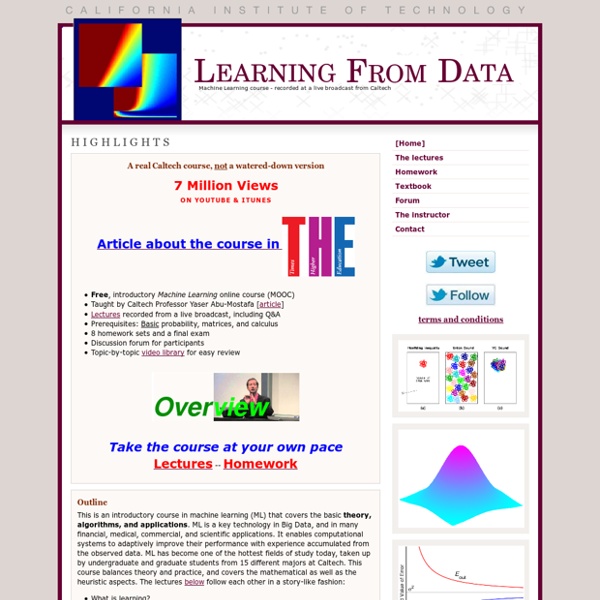STHDA - Home
Linear Regression Essentials in R Linear regression (or linear model) is used to predict a quantitative outcome variable (y) on the basis of one or mult... Interaction Effect in Multiple Regression: Essentials
Introducing PredictionIO
PredictionIO is an open source machine learning server for software developers to create predictive features, such as personalization, recommendation and content discovery. Building a production-grade engine to predict users’ preferences and personalize content for them used to be time-consuming. Not anymore with PredictionIO’s latest v0.7 release. We are going to show you how PredictionIO streamlines the data process and make it friendly for developers and production deployment. A movie recommendation case will be used for illustration purpose.
Home Page of Geoffrey Hinton
I now work part-time for Google as a Distinguished Researcher and part-time for the University of Toronto as a Distinguished Emeritus Professor. For much of the year, I work at the University from 9.30am to 1.30pm and at the Google Toronto office at 111 Richmond Street from 2.00pm to 6.00pm. I also spend several months per year working full-time for Google in Mountain View, California. Check out the new web page for Machine Learning at Toronto
Prismatic Architecture - Using Machine Learning on Social Networks to Figure Out What You Should Read on the Web
This post on Prismatic’s Architecture is adapted from an email conversation with Prismatic programmer Jason Wolfe. What should you read on the web today? Any thoroughly modern person must solve this dilemma every day, usually using some occult process to divine what’s important in their many feeds: Twitter, RSS, Facebook, Pinterest, G+, email, Techmeme, and an uncountable numbers of other information sources. Jason Wolfe from Prismatic has generously agreed to describe their thoroughly modern solution for answering the “what to read question” using lots of sexy words like Machine Learning, Social Graphs, BigData, functional programming, and in-memory real-time feed processing.
Data Mining: Practical Machine Learning Tools and Techniques
Machine learning provides practical tools for analyzing data and making predictions but also powers the latest advances in artificial intelligence. Our book provides a highly accessible introduction to the area and also caters for readers who want to delve into modern probabilistic modeling and deep learning approaches. Chris Pal has joined Ian Witten, Eibe Frank, and Mark Hall for the fourth edition of the book, and his expertise in these techniques has greatly extended its coverage. The book's online appendix provides a reference for the Weka software. SlidesTable of Contents
Learning From Data MOOC - The Lectures
Taught by Feynman Prize winner Professor Yaser Abu-Mostafa. The fundamental concepts and techniques are explained in detail. The focus of the lectures is real understanding, not just "knowing."
Gaussian Processes for Machine Learning: Book webpage
Carl Edward Rasmussen and Christopher K. I. Williams The MIT Press, 2006. ISBN 0-262-18253-X. Gaussian processes (GPs) provide a principled, practical, probabilistic approach to learning in kernel machines.
Introduction to Machine Learning
Practical information Lectures: Monday and Wednesday, 12:00PM to 1:20PMLocation: Baker Hall A51Recitations: Tuesdays 5:00PM to 6:00PMLocation: Porter Hall 100 (January 22, 2013), Doherty Hall A302 (January 29, 2013 onwards)Instructor: Barnabas Poczos (office hours 10am-12pm Thursdays in Gates 8231) and Alex Smola (office hours 2-4pm Tuesdays in Gates 8002)TAs: Ina Fiterau (office hours 2-4pm Mondays in Gates 8021), Mu Li (office hours 5-6pm Fridays in Gates 7713), Junier Oliva (office hours 4:30-5:30pm Thursdays in Gates 8227), Xuezhi Wang (office hours 5-6pm Wednesdays in Gates 6503), Leila Wehbe (office hours 10:30-11:30am Wednesdays in Gates 8021)Grading Policy: Homework (33%), Midterm (33%), Project (33%), Final (34%) with best 3 out of 4 used for score (final is mandatory).Google Group: Join it here. This is the place for discussions and announcements. Updates Overview
Datasets for Data Mining and Data Science
See also Data repositories Anacode Chinese Web Datastore: a collection of crawled Chinese news and blogs in JSON format.



